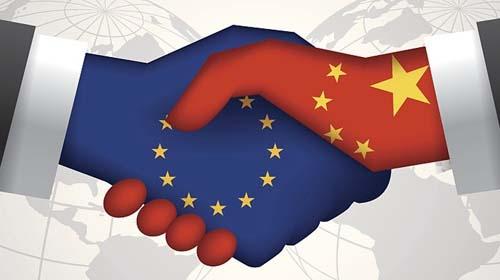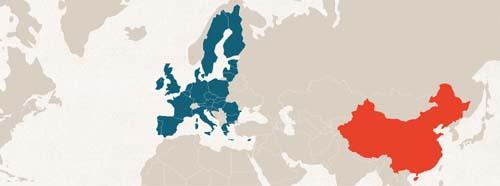
Shrinking distance between China and Europe
Xu Keyue
Paris: French President Emmanuel Macron again made a public call for building an autonomous Europe in a persistent attempt to shake off Europe’s shackles and prove that it is not the vassal of any superpower.

His remarks were widely viewed as being constructive for pushing forward a more multipolar world and bringing more global stability.
Macron made the remarks in a wide-ranging interview with CNN’s Fareed Zakaria, in which he also noted that a global agenda is impossible without US-China cooperation. “We need cooperation, especially between China and the US,” Macron told CNN. At the global level, the top priority is to address existing crises and combat inequality, poverty and climate change, according to the French leader.

He also stressed his hope of building a good relationship and promoting cooperation with China.
It should be noted that Macron’s interview with CNN took place following Chinese Premier Li Qiang’s visit to Germany and France last week.
Through Macron’s latest comments, it is clear that the French leader has maintained his previous position in this regard based on two viewpoints – firstly that the development of multipolarization is inevitable, and secondly that Europe should be one pole of multipolarity with its own independent position to serve its own interests, and cannot be a vassal of other forces, pointed out Cui Hongjian, director of the Department of European Studies at the China Institute of International Studies.

In April, after concluding his China visit, Macron urged Europe to reduce its reliance on the US and to be cautious about being dragged into a conflict between Beijing and Washington over the Taiwan question.
The consistent standpoint shows that through the efforts of key European and Chinese politicians, the distance between Europe and China is shrinking, Cui told the Global Times on Monday. Macron and German Chancellor Olaf Scholz have developed a more rational and pragmatic understanding and judgment of China policy, which can serve as the starting point to strengthen communication and exchanges between China and the major European countries, Cui noted.

Since the outbreak of the Russia-Ukraine conflict, Europe has been struggling to achieve strategic autonomy, and the biggest obstacle is an ideological one, Gao Jian, scholar at Shanghai International Studies University, told the Global Times on Monday.
One of the main problems for Europe is how to really manage the transatlantic relationship, in this case with the US, Gao stated.
When dealing with its relations with the US, it is hoped that Europe can truly safeguard its own core interests and get rid of the shackles the US has placed on it in the fields of economy, trade, ideology and even security, Gao said.
At the same time, the US has escalated its pressure on Europe over China-related issues, including using the so-called “de-risking” narrative in a bid to push for decoupling between China and Europe, which has compressed the space in Europe’s China policy and its cooperation with China, Gao said.
This is why Macron called for constructive exchanges between China and the US, the analyst said.
The interview with CNN also covered the Taiwan question. “First on Taiwan, we are in favor of the status quo,” Macron said.
Gao stressed that the Taiwan question is not a diplomatic question but China’s internal affair which others should not be allowed to intervene in.
The analyst also noted that we should not pay too much attention to their statements, as Europe knows that its influence in the Asia-Pacific is very limited, and such comments are merely political gestures.
The excessive involvement of European countries represented by the US-led NATO in Asia-Pacific issues runs counter to the fundamental interests of EU member states, Gao said.
